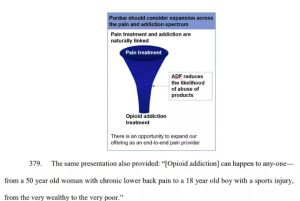Reportedly Purdue Pharma, the fine folk behind OxyContin, is nearing a settlement with 23 state attorneys general and thousands of other governmental entities.
Here are the key takeaways:
- this does NOT appear to be a universal settlement; other state AGs, local governments, employers, and other affected entities will almost certainly seek their own compensation from Purdue.
- The Sackler family, Purdue’s owners, will lose up to $3 billion of their personal fortunes estimated to total $13 billion – most of which came from OxyContin sales.
- Purdue Pharma will enter bankruptcy and future earnings will go to addressing the awful repercussions of the opioid crisis
What wasn’t included are criminal charges for the Sacklers; that is an outrage.
It is crystal clear many members of the family were intimately involved in Purdue’s efforts to shove more and more opioids down more and more throats. Not satisfied with those billions, the arrogant bastards were going to make yet more treating the addicts they created. (Note not all of the Sacklers were involved in the opioid disaster)
This from NY’s opioid lawsuit (credit Vox)

The unmitigated gall of the Sacklers is stunning; they knew their drugs were killing tens of thousands, and now wanted to profit from the untold damage they had done.
For workers’ comp, there are a couple of implications.
First, as the tort industry dives deeper into this, they will sue more and more participants. My informed opinion is payers are pretty safe for several reasons;
- state regulations are the primary and ultimate driver of work comp coverage;
- work comp entities led the charge to reduce opioids when they first grasped the size of the problem;
- payers did not receive rebates from opioid scripts so there was no financial benefit to allowing the scripts; and
- payers were damaged by the opioid industry due to much higher medical costs, extended disability duration and death claims.
I haven’t heard of any workers’ comp entity being sued for damages related to opioids – but it is possible.
Second, work comp payers have been damaged by the Sacklers and their ilk. While state funds may be involved in some of the suits seeking compensation for damages (it’s impossible for me to unpack all the plaintiffs in all the filings), I have yet to hear of any suits involving commercial insurers or reinsurers.
I’ll admit to being surprised at the work comp insurance industry’s seeming lack of interest in taking on the opioid industry. Every day:
- Insurers go after claimants for double-dipping and false claims,
- Insurers go after employers for falsifying payroll data,
- Insurers go after providers for fraudulent billing for practices, and
- Insurers sue each other over coverage issues and reinsurance claims.
Before anyone else could spell opioids, work comp payers saw the damage being done and took action.
What does this mean for you?
Work comp insurers must be a highly visible part of the solution; we owe it to policyholders and taxpayers, we owe it to patients, and we owe it to all of the insurer staff, regulators, researchers, and other stakeholders who’ve dedicated untold hours to fixing the damage done by the Sacklers and their ilk.
Need more incentive? Here’s David Sackler’s $22 million Bel Air mansion your workers’ comp dollars helped pay for.




In case you missed it, Pennsylvania’s AG filed suit yesterday against the Sackler family directly in response to this settlement. It will be interesting to see how that plays out.
Thanks Craig – I did miss that – appreciate the heads up.
This will likely play out like asbestos litigation in that once the money is gone from the manufactures they will start suing the supply chain. They are already laying the groundwork. This means pharmacies, PBMs physicians. I won’t be surprised to see insurance companies included in this as they all authorized and paid for the treatment. PBMs are the most at risk as they did receive rebates from the drug companies.
Also, as we are seeing this is not “tobacco settlement” money. Not even close. This money will disappear into the state budgets and those ultimately impacted won’t likely see a dime from it.
Thanks for the note Mark. I’d suggest it’s too early to forecast how much the total damages will be. No question tobacco was a monumental settlement – $206 billion set aside for the initial 25 years. That said there are many huge companies with big assets that are involved; Purdue is one of the smaller ones. J&J, Mallinckrodt, McKesson, Teva, Cardinal, Amerisource Bergen, Endo, CVS, Walgreens, Allergan, Watson Pharma and RiteAid are among the potential defendants. With the Purdue settlement reported to total $13 billion, the counter is ticking.
Much like medical malpractice, (which in many ways this is) I don’t think WC carriers can sue over their payments for the opioids. I think we would stand behind the injured workers who may be able to recover and then we could assert a lien against any recovery for the costs incurred as a result of the opioid addiction. Not and attorney, but just my guess as to why no WC carriers have sued.
Joe, no mention anywhere of the tens of thousands of individuals and families impacted by opioids. So much pain and misery left in the wake of those seeking to enrich themselves. The states will get their share, the manufacturers and supply chain will feel some financial pain, but nothing like the pain these families (my family) have and continue to endure. Who is their voice? My family doesn’t expect money but it maddens me that no one is speaking for the real victims of the opioid tragedy. No acknowledgment and no apology – very sad.
I listened to a podcast on the newly booming opioid industry in India- it was amazing to me that it’s the same players and the same general pushing of heavily addicted narcotics. I realize not every country is as litigious, but it seems crazy that they are basically now moving their market after proof that they are knowingly ruining people’s lives
https://www.npr.org/2019/09/05/757803872/u-s-drugmakers-target-the-booming-opioid-market-in-india